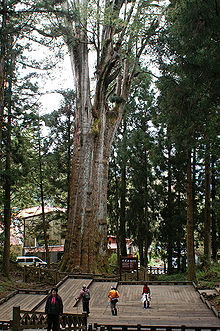|
Chamaecyparis formosensis
Chamaecyparis formosensis (Formosan cypress, Taiwan cypress, Taiwan red cypress;[1] Chinese: 紅檜/红桧 hóngguì, Taiwan pron. hóngkuài) is a species of Chamaecyparis, endemic to Taiwan, where it grows in the central mountains at moderate to high altitudes of 1000–2900 m. It is threatened by habitat loss and over-cutting for its valuable timber.[1][2][3] GrowthIt is a slow-growing, but long-lived and ultimately large to very large coniferous tree growing to 55–60 m tall with a trunk up to 7 m in diameter. The bark is red-brown, vertically fissured and with a stringy texture. The foliage is arranged in flat sprays; adult leaves are scale-like, 1–3 mm long, with pointed tips, green both above and below with only an inconspicuous stomatal band at the base of each scale-leaf; they are arranged in opposite decussate pairs on the shoots. The juvenile leaves, found on young seedlings, are needle-like, 4–8 mm long, soft and glaucous bluish-green. The cones are ovoid-oblong, 6–12 mm long and 4–8 mm diameter, with 8–16 scales arranged in opposite pairs, maturing in autumn about 7–8 months after pollination.[2]
Related speciesIt is most closely related to the Japanese Chamaecyparis pisifera (sawara cypress), which differs in smaller globose cones 4–8 mm long with 6–10 scales.[2] CharacteristicsThe wood is soft, very resistant to decay, and strongly scented; it is highly valued in traditional Taiwanese building, particularly for temples and shrines. This has led to excessive harvesting, resulting in the species now being endangered. A small number of the oldest and largest specimens are protected as national monuments, but much of the general population of the species still remains unprotected.[2] Essential oil distilled from its wood is uniquely scented and highly valued.[4] Notable examplesSacred Tree of AlishanThe Sacred Tree of Alishan was a 3,000-year-old Taiwan red cypress which died from a lightning strike in 1956. The trunk remained standing until 1998. Due to its sacred status it was left alone by the Japanese when they deforested the surrounding area.[5] References
External links |
||||||||||||||||||||||||||||||||



